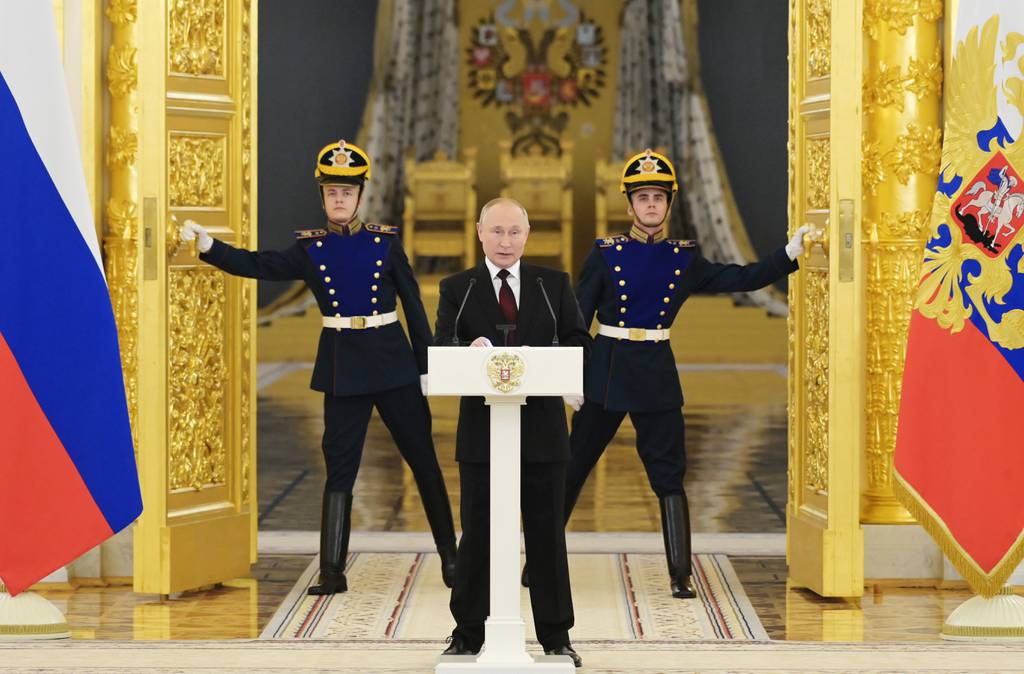Deputy Foreign Minister Sergei Ryabkov voiced Russia's readiness to immediately start negotiation with the US on guarantees that will safeguard European security interests and suggested Geneva as a venue for the talks.
"As for us, we are ready to begin talks with the United States in a third country immediately, literally already tomorrow, on Saturday, December 18," TASS quoted Ryabkov as saying at the briefing on Friday.
"We have already offered the Americans to meet in Geneva to launch these important talks on the basis, on the platform of the two draft documents we have, which we plan to promote while waiting for a constructive response from the United States," the Russian foreign ministry added.
Ryabkov's comments came after the ministry unveiled draft security guarantees that NATO deny membership to Ukraine and other former Soviet countries and roll back the alliance's military deployments in Central and Eastern Europe. The proposals suggest parties should settle disputes by "peaceful means and refrain from the use or threat of force in any manner inconsistent with the purposes of the United Nations." Russia presented its proposals, which are supposed to safeguard European security interests, earlier on Wednesday, during US Assistant Secretary of State Karen Donfried's visit to the Russian capital.
Previously, Russian President Vladimir Putin called on NATO to begin substantive talks on reliable and long-term security guarantees to Russia, charging the western military alliance for mounting threats on Russia's western border.
Russia is seeking legally binding security guarantees excluding any further NATO expansion eastward and deployment of its weapon systems in close vicinity to Russian territory amid rising tensions over Ukraine.
As the world's second strongest military power, Russia has repeatedly voiced concerns over the expansion of NATO's presence along the borders. The Kremlin claimed that any deployment of NATO troops to Ukraine threatens stability near Russia's borders and may trigger a strong response from Moscow to ensure its security.
While Russia is demanding security guarantees from the West, the US and its European allies are warning Moscow to pull back from the borders with Ukraine, claiming that Russia could be planning an invasion of the former Soviet country. Russia has repeatedly denied such claims, saying that it is free to move its troops within its borders and has no plans to attack Ukraine. Yet, the US has threatened sanctions on an unprecedented scale if it does.
Tensions between Russia and the West peaked as the world's second-largest military power made it clear that it may be forced to deploy intermediate-range nuclear missiles in Europe in response to what it sees as NATO's plans to do the same. Russia decreed a unilateral moratorium on the deployment of new missiles in Europe after the demise of the Intermediate-Range Nuclear Forces (INF), the world's last major arms control pact, following Washington's withdrawal from the pact in 2019.
Meanwhile, Ukraine has been trying to join the western military block in hopes of gaining protection against what Kyiv calls to be Russian aggression. Ukraine and Russia have been at odds since the 2014 crisis in Ukraine's southern and eastern regions. Ukraine accuses Russia of annexing the Crimean Peninsula that extends into the Black Sea. The Moscow-backed referendum held in March that year reportedly revealed that over 90 percent of Crimea's residents wanted the peninsula to be under Russian control. However, the vote was declared illegitimate by Ukraine, Western countries, and the United Nations.
Russia has also been accused of fueling conflict in Ukraine’s Donetsk and Lugansk regions and supporting the separatist regimes with weapons and troops. Moscow, however, has repeatedly denied those claims.







 The number of evacuees from flooded areas in Kazakhstan has reached 97,852 people, including about 32,856 children since March 27.
The number of evacuees from flooded areas in Kazakhstan has reached 97,852 people, including about 32,856 children since March 27.
 The Islamic holy month of fasting, Ramadan comes to an end this week with the celebration of a joyous festival called Eid (meaning “festival” in Ar...
The Islamic holy month of fasting, Ramadan comes to an end this week with the celebration of a joyous festival called Eid (meaning “festival” in Ar...
 Iran's senior military leaders described the drone and missile attack on Israel on April 14 night as “successful".
Iran's senior military leaders described the drone and missile attack on Israel on April 14 night as “successful".
 Azerbaijan officially unveiled the logo for the upcoming 29th session of the Conference of the Parties to the United Nations Framework Convention o...
Azerbaijan officially unveiled the logo for the upcoming 29th session of the Conference of the Parties to the United Nations Framework Convention o...



